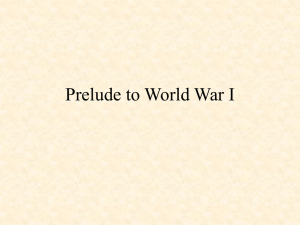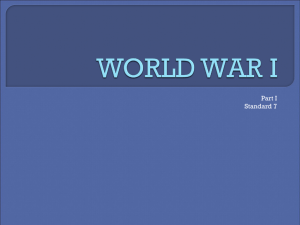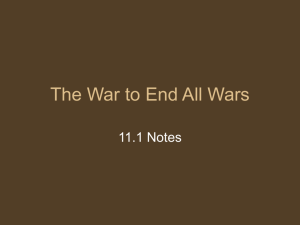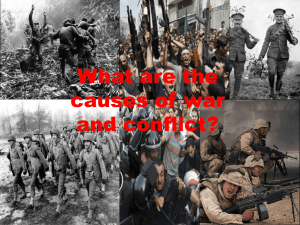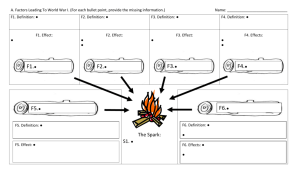The Great War *The War to End all Wars* WWI
advertisement
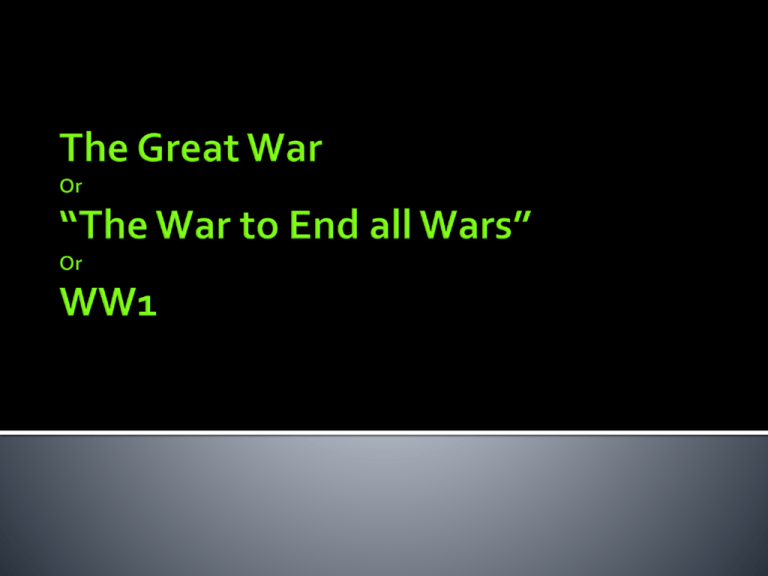
Imperialism Militarism Nationalism Alliances Europe competes for territory Why: Industrialization =need for more raw materials and markets. By 1914 only a few territories remained. ▪ Take lands that had already been taken ▪ Competition for what was remaining. Per capita industrialisation levels, 1860-1913 (UK in 1900=100) 140 120 100 80 1860 1880 1900 1913 60 40 20 0 Germany UK USA Gross Nominal Value of Capital Invested Abroad in 1914 ($ million) 20000 18000 16000 14000 12000 Africa Asia Latin America Western offshoots Europe 10000 8000 6000 4000 2000 0 UK France Germany Other US Because of the uncertain climate, European countries began building huge militaries. Britain developed the dreadnaught which gave Britain naval superiority. Germany made plans to build 33 of its own ships Comparative figures on army increase, 1870-1914: 1870 Russia 700,000 1914 1,300,000 France 380,000 846,000 Germany 403,000 812,000 Austria-Hungary 247,000 424,000 Britain 302,000 381,000 Italy 334,000 305,000 Japan 70,000 250,000 U.S.A. 37,000 98,000 Total military and naval personnel of the four principal European powers (thousands of men), 1890-1914 2500 Russia+France Germany+Austria-Hungary 2000 1500 1000 500 0 1890 1900 1910 1914 Military expenditures of the two European blocs, 1890-1913 (£ million) 300 Triple Entente Triple Alliance 250 200 150 100 1913 1912 1911 1910 1909 1908 1907 1906 1905 1904 1903 1902 1901 1900 1899 1898 1897 1896 1895 1894 1893 1892 1891 1890 50 German has plans before the war (Schlieffen) Step 1--Quickly occupy France through Belgium. Step 2--move to the eastern front (Russia). ▪ They assumed that Russia would take longer to mobilize. Most of the European countries felt a sense of pride and superiority. Other ethnic groups living in Russia, AustriaHungary and Germany desired unification. Russia supported the Slavic people, some of which were living in Austria-Hungary and others in Serbia. Important Example 1908 Austria-Hungary takes Bosnia Serbia believes Bosnia is rightfully theirs and those living in Bosnia agree Russia backs Serbia Two provinces on the border of France and Germany. The Rhine river flows through. France lost Alsace Lorraine to FrancoPrussian War of 1870-71 to Germany France saw the territory as theirs and wanted it back A complex system of alliances were established among European nations. The alliances entangled European countries with one another. The Dual Alliance--1879 Austria-Hungary and Germany A defensive treaty– Stated that if either country was attacked by another, they would support each other The Triple Alliance—1882 An extension of the Dual Alliance where Italy would assist if Germany was attacked and remain neutral if AustriaHungary was attacked All would attack if both Russia and France attack The Reinsurance Treaty---1887 Russia and Germany Russia and France agreed were to remain friendly with one another and support each other if an attack took place Conflicted with the Dual Alliance Treaty lapsed when Bismarck was gone in 1890 Franco-Russian Alliance– 1892 to support one another in case of an attack by another country. This created two teams of countries and led to suspicion and friction Anglo-Japanese Alliance 1902 Japan feared Russian encroachment in Northern China Britain feared German naval growth, French encroachment in Africa and Russian encroachment in the far east. Entente Cordiale 1904 Agreement between France and Britain. France would recognize Britain in Egypt and Britain would leave France alone in Morocco. Anglo Russian Agreement 1907 Agreement between Britain in Russia to settle territorial disputes This led to the creation of the Triple Entente which essentially isolated Germany and escalated tension. Britain, France and Russia 1879 The Dual Alliance 1881 Austro-Serbian Alliance 1882 The Triple Alliance Germany and Austria-Hungary made an alliance to protect themselves from Russia Austria-Hungary made an alliance with Serbia to stop Russia gaining control of Serbia Germany and Austria- Hungary made an alliance with Italy to stop Italy from taking sides with Russia 1894 Franco-Russian Alliance 1914 Triple Entente (no separate peace) Russia formed an alliance with France to protect herself against Germany and Austria-Hungary Britain, Russia and France agreed not to sign for peace separately. 1907 Triple Entente This was made between Russia, France and Britain to counter the increasing threat from Germany. Top 1907 Anglo-Russian Entente 1904 Entente Cordiale This was an agreement between Britain and Russia This was an agreement, but not a formal alliance, between France and Britain. Austria Hungary annexed Bosnia Many Bosnians wanted to be part of Serbia due to ethnic ties When Archduke Francis Ferdinand went to visit his soldiers in Bosnia on June 28th 1914, many Bosnians met his arrival with bitterness. A terrorist threw a bomb at the Archdukes car, it bounced off and injured two guards When going to visit the two injured guards, the archduke and his wife were shot by a Bosnian The assassination of the Archduke was followed by a threat toward Serbia to cease the support of terrorism in Bosnia. Unhappy with the reactions of Serbia, Austria-Hungary declared war on Serbia on July 28th, 1914 July 28, 1914- Upset by the assassination on the archduke, AH declares war on Serbia July 29- Russia, feeling obligated to protect Serbia, begins mobilizing troops. August 1st- Germany on Russia declares war Germany occupies Luxumburg and sets the Schlieffen plan into action. Germany asks Belgium permission to rolll through their country on the way to attack France Belgium Refuses Germany does not want Britain to enter the war and Kaiser Wilhelm II (German emperor) suggests that they not proceed. Moltke (the German Chief of General Staff) say that they must since the ball was rolling already August 3rd Germany declares war on France August 4th Germany invades France through Belgium putting the Schlieffen plan into action Because of a treaty signed by Britain decades earlier promising Belgium’s neutrality, Britain declares war on Germany on August 4th Both sides believed they would be victorious and that the war would be short and limited. Britain believed that it would be a primarily naval war which they felt they would dominate. Germany believed that Britain would remain neutral and thought of the treaty that kept Belgium neutral as a scrap of paper. A-H believed Germany would help flank the north while they invaded Serbia Germany figured that A-H would invade Russia while they took care of France. A-H was forced to split their army and were not able to take Serbia swifttly. In fact, Serbia forced A-H back. A-H therefore had limited troops to face Russia Germany swept through Belgium and made their way to the outskirts of Paris where they were stopped by British and French forces At the Marne River, both sides dug in and fortified their positions. A stalemate ensued– Trench warfare becomes the tactic of choice Animated Battlefront Death was a constant companion to those serving in the line, even when no raid or attack was launched or defended against. In busy sectors the constant shellfire directed by the enemy brought random death, whether their victims were lounging in a trench or lying in a dugout (many men were buried as a consequence of such large shell-bursts). Similarly, novices were cautioned against their natural inclination to peer over the parapet of the trench into No Man's Land. Many men died on their first day in the trenches as a consequence of a precisely aimed sniper's bullet. It has been estimated that up to one third of Allied casualties on the Western Front were actually sustained in the trenches. Aside from enemy injuries, disease wrought a heavy toll. Rats in their millions infested trenches. There were two main types, the brown and the black rat. Both were despised but the brown rat was especially feared. Gorging themselves on human remains (grotesquely disfiguring them by eating their eyes and liver) they could grow to the size of a cat. Men, exasperated and afraid of these rats (which would even scamper across their faces in the dark), would attempt to rid the trenches of them by various methods: gunfire, with the bayonet, and even by clubbing them to death. It was futile however: a single rat couple could produce up to 900 offspring in a year, spreading infection and contaminating food. The rat problem remained for the duration of the war (although many veteran soldiers swore that rats sensed impending heavy enemy shellfire and consequently disappeared from view). Rats were by no means the only source of infection and nuisance. Lice were a never-ending problem, breeding in the seams of filthy clothing and causing men to itch unceasingly. Even when clothing was periodically washed and deloused, lice eggs invariably remained hidden in the seams; within a few hours of the clothes being re-worn the body heat generated would cause the eggs to hatch. Lice caused Trench Fever, a particularly painful disease that began suddenly with severe pain followed by high fever. Recovery - away from the trenches - took up to twelve weeks. Lice were not actually identified as the culprit of Trench Fever until 1918. Frogs by the score were found in shell holes covered in water; they were also found in the base of trenches. Slugs and horned beetles crowded the sides of the trench. Many men chose to shave their heads entirely to avoid another prevalent scourge: nits. Trench Foot was another medical condition peculiar to trench life. It was a fungal infection of the feet caused by cold, wet and unsanitary trench conditions. It could turn gangrenous and result in amputation. Trench Foot was more of a problem at the start of trench warfare; as conditions improved in 1915 it rapidly faded, although a trickle of cases continued throughout the war. 30% of all Americans were 1st or 2nd generation immigrants Ties to their homelands ▪ German-Americans + Irish-Americans= Pro G Most Americans felt closer to GB due to the commonalities that exist and the roots of America Germany viewed as chief aggressor and therefore, brutes. ▪ Invasion of Belgium described as “a force of nature like a tidal wave, an avalanche or a river flooding its banks,” and destroying libraries cathedrals, and, sometimes, entire town in Belgium and France. Richard Davis, 1914 British propaganda supported this assertion From 1897 to 1914 Americans had seen oversees investment rise from 700 million to 3.5 billion dollars. When the war broke out, the investments were threatened Wilson’s policy of neutrality supported continued trade with both nations, though our investments in with the allies were much weightier than those of the central powers. Britain began using naval blockades to prevent trade. Large corporations (which still had a great deal of influence on Government at the time) faced the possibility of loosing enormous amounts of money due to the decrease in trade The naval blockades posed a serious threat to corporate profits German Submarine Warfare Naval rules discouraged attacks without warning on merchant ships Germans began attacking allied ships carrying supplies and blockading German ports. These attacks posed a serious threat to neutral ships carrying supplies These attacks also made America distrustful of Germany due to their unconventional methods German’s sent fleet to the North Sea to attack the British blockade. Ended in stalemate and German retreat The Germans developed the U1 and U2 submarines which they used to destroy ANY ships that were in the waters surrounding Britain. The policy of unrestricted submarine warfare led to the sinking of British passenger ships as well as ships transporting American goods to Europe A British passenger ship carrying Americans is torpedoed and sunk in the by a Germany sub. America warns Germany and Germany responds with promises French ship, the Sussex, is sunk less than one year later. Sussex pledge– another German promise to not sink passenger ships 10 months later– Germany ended this and resumed unrestricted submarine warfare. Telegram proposing that Mexico attack U.S. if U.S. enters the war against the Central Powers. In return, Germany promised to help Mexico regain its territories intercepted by Americans That’s the last straw--WAR!!! Some historians believe that Britain and France had ulterior motives and attracted as many neutral ships into the area as possible. Why? Some historians also believe that the Lusitania was not the cause of America’s entry into the war but rather an excuse. American corporations were making tremendous profits from the war and the sinking of ships filled with war supplies was resulting in profit losses. America on the Home Front Liberty bonds– A special war bond sold to help raise money for the war efforts. ▪ Provided about 25% of the funding for the war. Over $20 billion was raised by the treasury To help sell these bonds ▪ Boy Scouts, and Girl Scouts set up booths on street corners ▪ “four minute men” (usually famous people) gave short (four minute) speeches to help promote the sale of war bonds Two new agencies that regulated production and trade. The former told producers what, how much, and even how much to charge The latter regulated international trade. ▪ Punished those trading with enemy In 1915 Ford opposed the war stating that he would burn his factories to the ground before manufacturing war goods In 1917 Ford accepted orders for 16000 tanks, 20000 tractors and antisubmarine ships. Federal aid was provided to entice this change Lever Food and Fuel Control Act ▪ Enabled president to regulate distribution of food and fuel according to the needs of the military “Food will win the war!”—Worked to increase farm output and reduce waste. Herbert Hoover led the Food Administration and was given the power to manage how much food people bought, impose price controls, and begin rationing food. Women promoted the war effort by preaching the “Gospel of the Clean Plate.” ▪ Stop, before throwing any food away, and ask, ‘Can it be used?’…Stop catering to the different appetites. No second helpings. Stop all eating between meals…One meatless day a week. One wheatless meals a day… No butter in cooking: use substitutes. Shifting an hour of sunlight increased the daylight hours therefore ▪ Promoting longer workdays and therefore production increases ▪ Reduced the need for artificial light therefore saving resources Banned: ▪ Anything pro-German German Music, writing, language, books, names, etc. German Sheppard, Frankfurter, Hamburger, German Measles, etc. ▪ Anything Anti-Britain (American Rev. Film) Government hired former muckrakers to begin rallying for support through journalism Restrictions on immigration to prevent espionage. General hostility toward Germans “Hate the Huns” Robert Prager (despite attempt to enlist) lynched. Sedition and Espionage Act Sedition Act made it illegal to voice anything that was “disloyal, profane, scurrilous, or abusive” about America Espionage Act– Made it illegal to interfere with the draft. Movement to eliminate Monarchy beginning in early 20th century Radical Bolsheviks (working class) uprisings In March of 1917, Czar Nicholas II no longer in power British and French hoped that Russia would stay in the war Germany wanted her out Lenin was escorted to Russia to inspire revolution Lenin’s goals would help Germany Lenin saw WWI as "One slaveowner, Germany is fighting another slaveowner, England, for a fairer distribution of the slaves". Vladimir Lenin, imprisoned in Germany, released and sent to take power in Russia. ( current leader was keeping Russia in the war) 9 million soldiers dead 10 Million civilians dead 7 Million soldiers permanently disabled 1918 influenza outbreak kills upwards of 50 million 337 billion dollars spent (4.5 trillion today) Most countries faced bankruptcy US has 3.5 billion in overseas loans •14 Points •The League of Nations •The Treaty of Versailles January 1918– 10 Months before armistice 14 Points came from the collection of work done by a 150 member advisory board It was a plan for peace based on moral standards– Very idealistic Used as propaganda and dropped behind German lines to seem as though there would be a just outcome of the war 1. 2. 3. 4. 5. 6. 7. 8. No Secret Treaties Freedom of the Seas Free Trade Disarmament End Colonialism Russia is given its right to independent development Belgium restored and evacuated Return of Alsace Loraine to France 9. Italy’s borders were t o be redrawn based on nationality 10. Autonomous development of Austria-Hungary 11. Romania, Serbia, Montenegro, and other Balkan states autonomous 12. Turkish autonomy 13. Polish independence 14. Multilateral association of nations to maintain peace (eventually the League of Nations) Many of Wilson's 14 Points were based on progressives’ ideas The speech was made before other countries were made aware of the plan Wilson began promoting his plan overseas All the countries were unhappy with parts of the plan Why? ▪ ▪ ▪ ▪ France wanted reparations Britain did not like the “Freedom of the seas” idea Italy obviously did not like the new borders All the countries wanted to keep their colonial claims Senator Henry Cabot Lodge, head of the Senate Foreign Relations Committee, had been a long-time critic of Wilson Lodge, after reading the draft of the League of Nations proposal from the Paris Peace Conference, objected and gained wide spread support for this opposition among the Senate Article X was at the forefront of the opposition Collective security agreements. All territorial borders drawn at Versailles would be respected and protected by members of the league Borders would be protected using economic sanctions and military force ▪ Why so bad???? Many Congressmen feared that this would endanger the Monroe Doctrine – ▪ There was an addendum that assured the integrity of the Monroe Doctrine, that helped appease the opposition later Many were also opposed to creating ties to Europe where future intervention would be inevitable if conflict broke out. Only 4 major countries were involved in the Paris Peace Conference (although many smaller nations wanted to attend because of the nationalistic aims) France– Clemenceau Italy-Vittorio-Orlando Britain-David Lloyd George United States- Woodrow Wilson (Japan was also involved but not as important) The idea of self-rule was strongly opposed by France, Italy and Japan who wanted to maintain control of their colonial claims The Idea of “Mandate” was introduced that would give Allied control over the territories of the central power until the natives could be “prepared” to rule themselves Eastern Europe was broken up into a multitude of new nations including: Poland Czechoslovakia The Baltic States Yugoslavia Regardless of their independence, the minority ethnic groups of the new states saw the new borders as unjust. Germany had to give up numerous territories, the most notable, France got Alsace-Loraine War-Guilt Clause (Germany must accept guilt for the war) Demilitarization and occupation of the Rhineland German Army <100,000 and no tanks, heavy artillery, aircraft, and limit to navy vessels under 100,000 tons with no submarines Germany has to pay for all damages to the allied countries Establishment of the League of Nations Wilson was a bit unpleased about the harsh outcome of the treaty He was happy and had absolute faith in the new League of Nations as a peace keeper for the generations to come European nations all had some faith in the new League of Nations yet all also had felt uncertain and had some misgivings (iereactions were uncertain) Positives It may keep peace Supported by teachers and clergy Negatives Entangle America in Distant Disputes Legitimacy of actions that may be taken by the League Ethnic Americans ▪ German-Americans did not see that punishment of Germany as being reasonable ▪ Irish-Americans did not like that Ireland was not freed from Britain's control ▪ Italians did not like that Italian territory was taken Three different votes led to Wilson’s realization that the United States would not be a member of the League of Nations Why Wilson Preached Morally He refused to include the republicans in on his plan He was determined to push it through Early League did not include Germany or Russia. Therefore 3 of the worlds superpowers were not included Eventually more than 60 member nations. Lacked credibility because the US did not join Solved issue pertaining to some islands disputed between Sweden and Finland Dealt with a conflict in Turkey Prevented a war between Bulgaria and Greece who disputed their border Dealt with other issues including: ▪ ▪ ▪ ▪ Child Slave Labor Drug Addiction Smuggling Financial Aid to those in need The League established the organizations which are now part of the United Nations including: ▪ ▪ ▪ ▪ World Health Organization United Nations High Commission for Refugees International Court of Justice International Labor Organization No military force because member nations were not required to provide troops so: ▪ ▪ ▪ ▪ ▪ Poland seized Lithuanian town Italy seized Fiume (Port given to Yugoslavia after war) Russia and Poland went to war France and Belgium invaded Germany Japan invaded Manchuria Harsh terms of the Treaty of Versailles Germans were unable to pay war debts Massive unemployment Wanted their lands back Hitler promised economic betterment and the return of the German lands Resentment and despair The League Wanted to act unilaterally Did not want to be entangled Wanted to secure interests in west Wanted all war debts to be paid Europe thought the US would forgive some of the debt but they did not. This led to resentment


